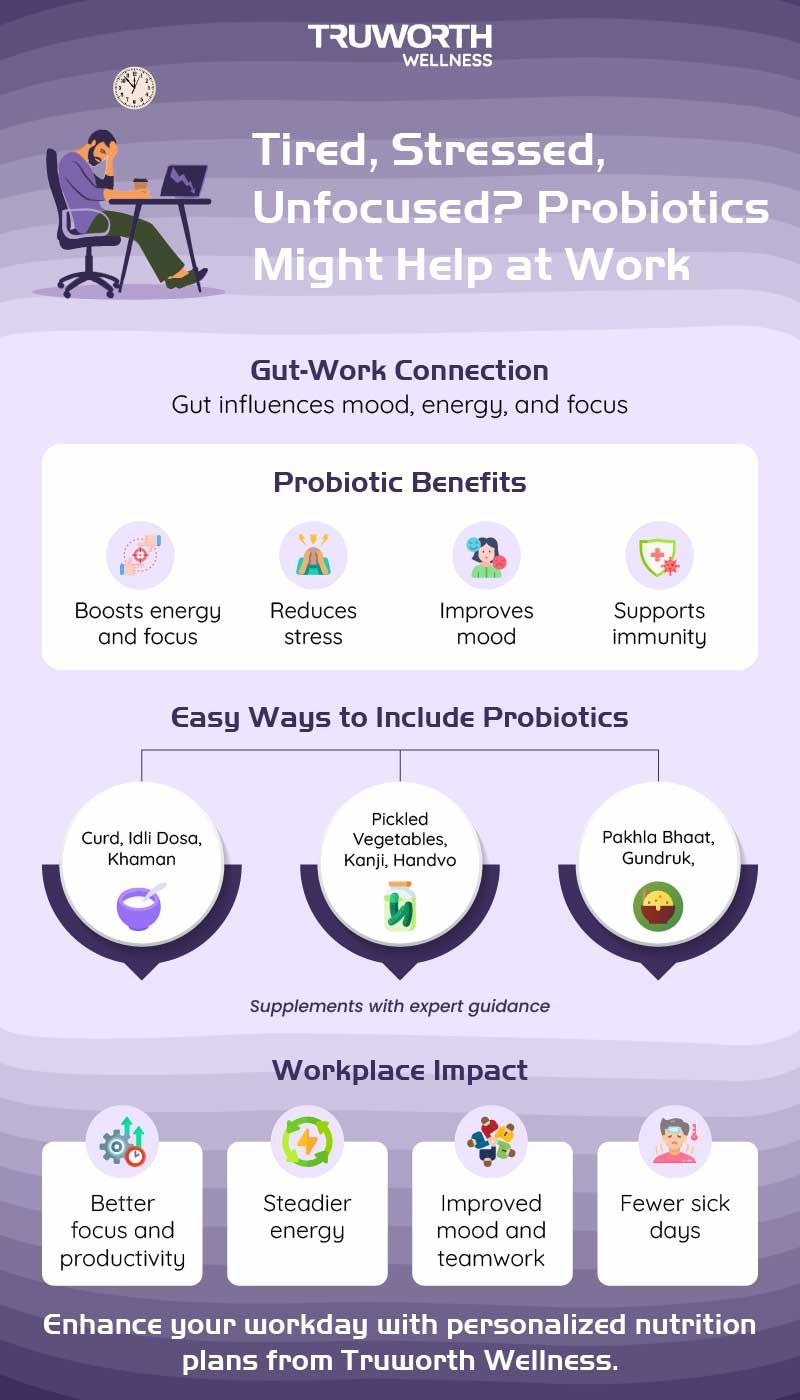Tired, Stressed, Unfocused? Probiotics Might Help At Work

Ever felt drained halfway through your workday, struggling to focus on tasks that normally feel easy? Or found yourself reaching for that extra cup of coffee just to push through meetings? Many of us chalk it up to long hours, stress, or lack of sleep. But emerging research suggests there might be a less obvious culprit: your gut health.
Yes, the tiny organisms in your digestive system could be quietly influencing your energy, mood, and focus. And the good news is that probiotics, often associated with gut health, could be an unexpected ally in your journey toward better workplace wellness.
Understanding The Gut-Brain Connection
Your gut is often called your second brain.
This is not just a catchy phrase. The gut contains millions of neurons and produces neurotransmitters like serotonin, which influence mood and cognitive function. The gut-brain axis is a two-way communication system linking your central nervous system with your gastrointestinal system. This means that when your gut is imbalanced, it can manifest as stress, fatigue, or difficulty concentrating.
Research increasingly shows that the composition of gut bacteria plays a role in mental wellbeing. Imbalances, sometimes caused by poor diet, stress, or irregular sleep, can affect the production of neurotransmitters that regulate mood and focus. This is where probiotics come in.
A balanced gut microbiome can help maintain stable energy levels, reduce brain fog, and even support better decision-making. When your gut is thriving, your mind is more resilient, and you are better equipped to navigate work challenges.
Also Read: The Hidden Link Between Employee Productivity And Gut Health

How Probiotics Can Help Workplace Wellness?
Probiotics are live beneficial bacteria that support a balanced gut microbiome. They are commonly found in fermented foods like yogurt, kefir, kimchi, and kombucha, or can be taken as supplements. While probiotics are often discussed in the context of digestion, their benefits go beyond the gut.
Energy And Focus
Certain strains of probiotics may help reduce feelings of fatigue. By supporting efficient digestion and nutrient absorption, probiotics ensure your body is getting the fuel it needs to stay alert. A healthy gut can also regulate inflammatory responses that sometimes cause tiredness. Employees with steady energy levels are more likely to stay productive without feeling constantly drained.
Stress Management
Chronic stress at work is common, and it impacts the gut. Studies indicate that probiotics may help modulate stress responses, reducing cortisol levels and promoting calmness. Employees who manage stress better can think more clearly, communicate effectively, and maintain resilience even during busy periods. Small improvements in stress response can have a significant impact on team dynamics and overall workplace morale.
Mood And Emotional Balance
Mental wellness is an essential component of corporate wellness programs. Probiotics have been shown to influence serotonin production, which can improve mood and emotional stability. A balanced mood translates to better collaboration, problem-solving, and overall workplace harmony. When employees feel emotionally balanced, they are more likely to contribute positively to company culture and long-term goals.
Immune Support
Office environments expose employees to germs daily. Probiotics can enhance immunity by maintaining a healthy gut microbiome, potentially reducing sick days and improving overall productivity. Stronger immunity helps employees stay consistent in their work, reducing the ripple effect of absenteeism on teams and projects.
Simple Ways To Incorporate Probiotics At Work
Adding probiotics to your daily routine does not have to be complicated. Here are some practical strategies:
- Start Your Day with Fermented Foods: Yogurt or kefir with fruits can be a quick and refreshing breakfast.
- Include Probiotic Snacks: Consider small portions of kimchi, sauerkraut, or probiotic drinks during breaks.
- Hydrate with Functional Beverages: Kombucha or other fermented teas can be a healthier alternative to coffee or sugary drinks.
- Supplement Wisely: If your diet does not regularly include fermented foods, probiotic supplements can help. Consult a nutritionist or wellness coach to find the right strain and dosage for your needs.
- Pair with Prebiotics: Prebiotics, found in foods like bananas, garlic, and oats, feed good bacteria and enhance probiotic effectiveness.
Even small daily adjustments can make a difference. Swapping one sugary snack for a probiotic-rich option or adding fermented foods to lunch can create noticeable improvements in energy and focus over time.
Corporate Wellness Programs And Gut Health
Many corporate wellness initiatives focus on exercise, mindfulness, or nutrition, but gut health is often overlooked. Integrating probiotics into wellness programs can offer tangible benefits for employees. Workshops on gut-friendly meals, access to probiotic-rich snacks in pantries, or guidance on supplements can support both physical and mental wellness.
Forward-thinking companies are now exploring initiatives such as gut health webinars, providing probiotic options in cafeteria menus, and including microbiome-friendly nutrition in wellness challenges. These steps signal to employees that the organization cares about holistic wellness, not just surface-level perks.
When employees feel better in their bodies, their productivity and engagement often increase. A culture that encourages small, sustainable wellness practices can make a significant difference in employee satisfaction and retention.
Real-Life Impact
Imagine this scenario: an employee frequently feels fatigued and distracted, relying on caffeine to power through the day. After incorporating probiotic foods into meals and snacks, they notice improved digestion, more consistent energy levels, and better focus in meetings. Their stress feels more manageable, and they are able to contribute ideas without feeling mentally drained.
These changes may seem small individually, but collectively they contribute to a healthier, happier, and more productive workforce. When employees experience better energy, improved mood, and stronger immunity, companies also benefit through higher engagement, fewer sick days, and a positive work culture.
Mindful Integration
It is important to remember that probiotics are not a magic solution. Multiple factors, including diet, sleep, physical activity, and stress management influence gut health. Probiotics work best when integrated into an overall wellness strategy that addresses these elements. Mindful eating, adequate hydration, regular movement, and stress reduction practices amplify the benefits of probiotics.
Organizations can encourage employees to adopt these habits by offering flexible schedules, mindfulness sessions, and access to nutrition experts. Pairing probiotic consumption with broader wellness support creates a comprehensive approach that benefits both the individual and the team.
The Takeaway
Feeling tired, stressed, or unfocused at work is often dismissed as part of corporate life. But paying attention to gut health can offer a surprising solution. Probiotics support a balanced microbiome, which influences energy, mood, focus, and immunity. By incorporating probiotics into daily routines or corporate wellness programs, employees can experience tangible benefits that go beyond digestion.
Corporate wellness is evolving, and forward-thinking organizations are recognizing that wellbeing starts from the inside out. Your gut may just be the secret ingredient to better workdays, improved productivity, and a more positive workplace culture.
Take charge of your gut health and boost your workplace energy. Explore personalized nutrition plans and probiotic guidance with Truworth Wellness today.